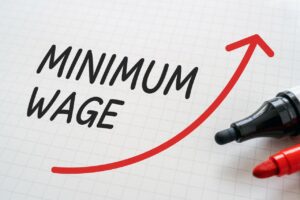New Year’s Financial Resolutions
Jeff Schwartz our Executive Director and Ben Allen, our Community Outreach Manager, discuss New Year’s Financial Resolutions. If you’re looking to get your finances on track after the holidays, don’t miss this video! We discuss S.M.A.R.T. goals and how the system can be applied to help you
Ben: All right. Hello everyone, and welcome to another Consolidated Credit webinar. We’re joined here with our executive director, Jeffery Schwartz, again and today, we’re going to talk about financial goal setting, and a popular time for many to set goals would be as a New Year’s resolution. So, yeah, thanks for joining us. Let’s get started!
Jeff: Pleasure to be here thanks Ben.
Ben: Okay, so, today we’re going to talk about setting new year’s resolutions as financial goals. New year, new goals. So, we’ll spend some time talking about goal setting and the reasons why so many of us fail to accomplish our financial goals. To do that, we’ll take a look at setting smart goals. So, of course we’re going to spend some time breaking down that acronym. Financial New Year’s resolutions. They’re something that come and go, you know, pretty much every year, just as regular new year’s resolutions tend to go. So, since new year’s is fast approaching and many Canadians are usually breathing a sigh of relief this time of year, you know, they’ve gotten through summer vacation season. They’ve managed to navigate the world of back-to-school shopping lists. They might have had some fun and spent some money around Halloween, and many feel like they have just survived the holiday season.
Jeff: You know, you’re right Ben. By the time January 1st rolls around, many Canadians feel like they’ve been put through the wringer financially and now they’ve got to, a chance to take a big breath and really kind of catch up. It really makes sense that it’s a good time of year to set some goals or resolutions or the coming year. So, the big question is “What do you want to do with your money?” First, let’s look at what you want to do with your money this year. Now, the new year is upon us, but it may also be worthwhile to take a look at what you want to do with your money next year as well. Now, how will your financial goal that you set this year help you with your financial goal for next year or even in 3 years? All of our financial goals should be structured this way, with an eye towards a long-term financial goal, such as retirement or paying outfox mortgage. Perhaps even creating a will or an estate plan, but that’s kind of putting the cart before the horse. So, let’s get back to our short-term goal first.
Ben: Right. We always want to start with a short-term goal. Maybe something that lasts for up to one year. So, what do you want to do with your money in the next year? So, before we get all gungho about what we want to do with our money and what our goals are, as a financial counsellor, I’m going to have to step in and say that you need a well-funded emergency savings account before we move on to other financial goals. So, how much do you need? That’s a popular question I get whenever I bring up the topic of emergency savings. How much do I need to have in my emergency savings plan? So, Jeff, I’m sure you’ve heard that question quite a lot in your time. So, how would you help someone come up with an amount that they would need for their emergency savings? You know, six months’ worth of basic living expenses stashed in a savings account can be a daunting and seemingly impossible task for some to achieve. So, what advice would you give to someone looking just to start simple emergency savings fund?
Jeff: Well, the best thing you can do today is just to just start, even if it’s with a really small amount. Start with small amounts, and just like you’re seeing in the tips here, make it a weekly habit. Set up an automatic savings plan at your bank or your financial institution, and start putting away a small amount as an automatic deduction from your paycheck, or at the beginning of each month, just put it aside. If you don’t think you can afford this, try cutting down on a smaller or daily expense, like coffee or lunches out, and then take that money. If six months of food rent and utilities seems impossible right now, aim for $1000 to start. In reality, $1000 probably isn’t enough for an emergency savings fund for most Canadians, but it’s a start, and once you get the thousand dollars, you’ll try and grow it to $2,000. There are thousands of things that can happen out of the blue, that can cost you big. You might need a car repair, an emergency dental procedure, or maybe even somebody in the family got sick, or it could even be your dog or your cat, and all of a sudden, those bills start to add up. Whatever it is, try and have some savings in place for that. It’s a personal question that’s going to be different for everyone based on their situation, but start somewhere, even if it is just a thousand dollars for now.
Ben: Great points Jeff, and that’s something I’ve done with counselling clients. You know, I ask them “What is the worst week of your life, or what might that look like?” and often times, just as you said, having the car break down the same week that the water heater dies is probably going to cost a whole lot more than $1,000, but starting small is going to start to build that confidence and then eventually, you know, you’ll start to become more secure, and you’ll feel better, and you know you’ve already got some emergency savings in place maybe, you know, then what. I hear that a lot, “I have a bit of money in savings”. I want to start small. “Now what can I do?” Well, again, we’re going to go with the short-term goals. Come up with something that you or your money, should do in the next one to three years, and again, always ask yourself how these goals are going to relate to your long-term goals. For instance, if your goal is to get a down payment on a house together in three years, then the longer-term goal would be to pay off your mortgage. Longer than that, you might want to include that home or an asset in your estate. So, while paying off your mortgage might seem like climbing mount Everest at first, getting the down payment together would be like reaching the first base camp, and to help us with that goal progression, all you need to do is remember to be smart. So, the first rule to smart goal setting is that the goal needs to be specific. When I hear someone say, you know, their financial goal is to save more money, to get out of debt, I kind of let them know that those are good ideas or wishes but until we specify that idea, it’s not a goal. It’s just a dream at that point. We need dollar amounts or percentages. Something like “I will save 5% of my paycheck to develop an emergency fund”. That’s much more useful than saying “I want to save money for emergencies”. You can also include things like what accounts you’re going to use. Maybe, something like “save 5% of each paycheck in a TFSA or put 25 dollars a month into my RESP.” That’s going to help you understand and ultimately achieve your goals. So, really, what you’re trying to answer is as many of the five w’s as you can. Who, what, where, when, why, and it’s probably a good idea to throw a how in there, while you’re at it.
Jeff: That’s great. So, next we’ve got “M” then for measurement. You need to measure your goal, and if it’s a financial goal, it’s pretty easy to do that, since we’re most likely talking about money. So, how much are you saving? $10? $25? Write it down, so you know that this is the measurable amount of money that you’re using. Next, you’ll want to measure the frequency, or how often. Is it going to be once a month, or every week? The bottom line is you need to get some way to measure it. So, how will you measure your goals? The easiest way is to set an amount and frequency, and then check in on them every once in a while. If it’s been two months, and you haven’t saved anything, then your measurements need to be adjusted. Otherwise, the goal just might not be obtainable at all.
Ben: As we’ll see next, “A” is for attainable. You need to be sure that you can do it and that it’s within your reach. If someone tells me that their goal is to save more money each month, and then we find out that they’re unemployed, then that goal probably isn’t attainable right now. For a goal to be attainable, you need to look to your personal situation, and whether or not you have the time and effort, and is that going to be worth it, especially when it relates to accomplishing that goal. Debt is often a good example of this. You know, there are people out there that simply have too much debt. They are insolvent. They’ll never be able to pay it off on their own. If their goal was to be debt-free in five years, it might be a completely unattainable goal. No matter how much work, or how many assets they sell off, they’ll never be able to pay off their debts without help from a credit counsellor or an insolvency trustee.
Jeff: So true. Thanks Ben, and more than anything else it also has to be relevant to you. You’re not going to be motivated unless it’s relevant to your situation, and in particular, a lot of people are stressed about their finances, so paying off debt is definitely relevant to them, but can you do it and more importantly, will it help you with all your other goals? So, for instance, many young people entering the workforce want to buy a car, so if it’s their goal to get $3,000 together for a down payment, then that’s going to be helping you towards the longer term and ultimate goal of buying that car. So, you’ll also need to take some time and look at what else is required for that goal. Will you need the help of a professional, like a mortgage broker for a house, or is it something you can handle yourself? Will you involve the family or is this a personal financial goal? All the questions will need to be examined if you want to set and achieve a smart financial goal.
Ben: And we’re not done yet, of course. We’ve saved the best for last. Timely or time-based goals usually do a little bit better, and I think they’re, you know, some of the better ones out there, but this is often where I see my clients failing at their goals. They come up with a very specific and easily measurable goal. It’s attainable to them. It’s relevant to their situation, but the time limit was off or wrong, or just missing completely. So, don’t worry if you miss a goal because of a deadline. The big part of setting any goal is to learn from your mistakes. I actually failed a financial goal just this past month. I was supposed to get my credit reports in October. Well, October is almost over, and I haven’t even printed off the mail-in request forms from the credit bureaus. So, I’m going to fail that goal, but I’m not going to give up on it. I still want my credit reports. Only, next month, I’m just going to break that goal into smaller pieces. So, you know, instead of getting my credit report this month, I’m going to change my goal to something like download and print off the credit report request forms by November 1st. I think that’s tomorrow, so, I better hurry up on that. The second part of that goal will be to submit them and mail them in by November 8th. So, the original goal is just too ambiguous and too big for me. October wasn’t enough time, so, I failed, and I learned, and then I tried again. So, I mean, it does sound like my undergrad all over again, but the point is to stick to a timeframe or a date on your goals. You want it done during this time period or you want it done by this day. To me personally, that’s the most important part of setting goals. Finding a time. Making it fit the schedule, so, really just putting in a time period on it.
Jeff: You know, Ben, we’ve talked a lot at length about smart financial goals. Let’s go through some quick examples, that will hopefully help you, when you set your financial goals for the new year. Ok, so, we as counsellors hear all the time that Canadians want to save more money, and we know from the polls and the research that really, it just isn’t happening like it used to. So, the idea, not the goal, is to save more money. Well, how can we do that? Let’s make it smart. Setting up an automatic savings plan is a great idea and the time limit is by January 1st. So, I’d say that that’s a smart goal as long as it’s attainable for the person, and if they were to throw that money into a tax-free savings account, they’d have over a thousand dollars in two years. What if you don’t have a TFSA? Well, there’s another easy financial goal. I’ll make it even smart for you. Open a tax-free savings account at my bank by the end of the month. It’s free. Every bank and financial institution offers them and they can be set up online, over the phone, or in person. Wherever, you bank.
Ben: All right, so, setting up TFSA. It’s easy. It’s attainable. I would recommend everyone have one. So, yeah, that’s an easily attainable smart financial goal you see there. So, some real smart goals and other ones that aren’t so difficult to accomplish either. So, let’s go back to that car example that we had earlier. I hear this a lot from younger participants in my workshops. They all want to buy a car at some point. So, let’s say, you know, you needed three thousand dollars for a down payment. Well, let’s make that as smart as possible. I guess what we have there is what I’d call, a “smar” goal. There’s no “T”, so we need to add a time period to it, and we could probably work on the “S”, the specific, a little bit more. So, you might be able to make it a little bit easier to attain if we broke it down like this. Okay, let’s save one hundred and twenty-five dollars per month for the next two years in a tax-free savings account for a down payment on a used Corolla. So, after two years with compounding interest on that account, they not only accomplished the financial goal. They’d exceed it. It’s much more specific and, you know, they’re still hitting the idea. They’ve saved three thousand dollars for a down payment on a used car. So, when it comes to your new year’s financial goals, the first thing to remember is to start simple. Fund your emergency account with as much money as you think you’re going to need to cover those unexpected expenses, because they do happen, and often, they happen at the worst possible time. Next, you’re going to want your goal to be smart. This will help you, one, achieve your goals, and two, help you redefine your goals if you happen to fail them. And if you’re anything like me, you’re probably going to fail a lot more financial goals than you achieve, but what can I say? I’m a dreamer. It doesn’t mean that I fail every goal and I never try again. Like most people, I usually learn something after I fail, and I try to apply that to a newly redefined goal. Often, it’s my redefine goals that are easiest for me to achieve. So, start now. All right, so, if you want to connect with us, I hope you’ve learned something, and if you want to learn more, you know, you can connect with our resources at the website there. The new year is fast approaching, so if you wanted to learn a little bit more about goal-setting or perhaps, speak to one of our financial counsellors and set some goals yourself, please be sure to check out our website and feel free to contact us at the information you see there. I’d also like to thank Jeff, again, for being with us today, and I want to wish everyone a safe and happy new year!
Jeff: Thanks very much Ben, and all the best over the holiday season and wishing everybody prosperity and debt-free new year!
Ben: Right. Thanks for joining us!




